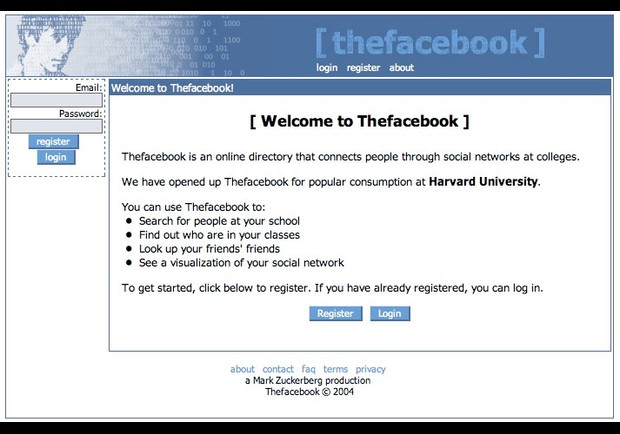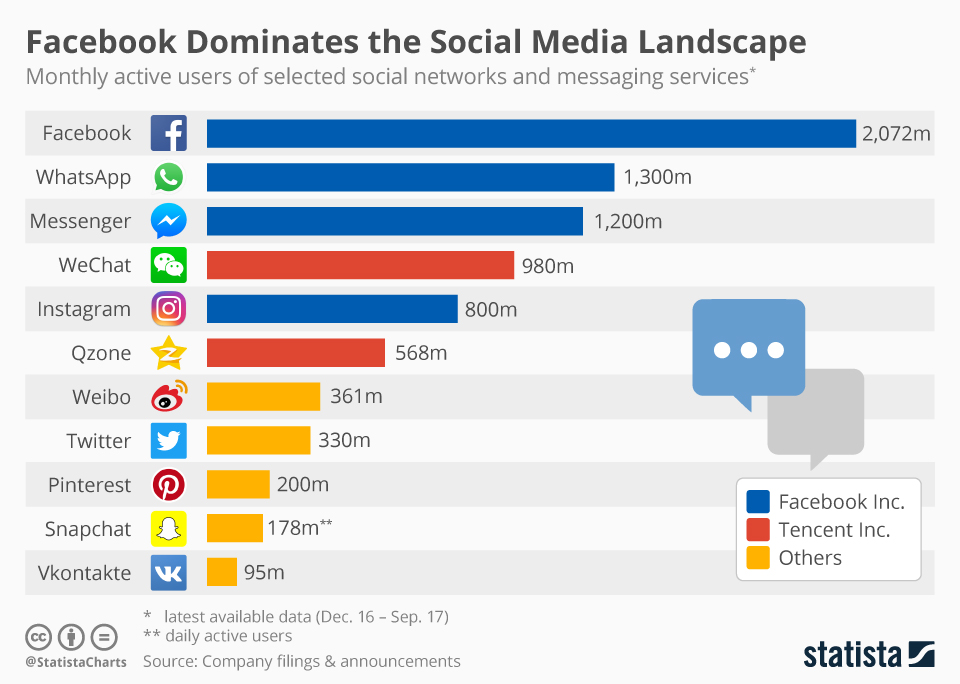Today marks 15 years since the founding of the largest company in the world.
Today Facebook is a global business with over $ 50 billion in revenue a year. It is used by about 2 billion people worldwide. And the value of the company exceeds half a trillion dollars.
In this article, the PaySpace Magazine editors have collected several secrets of the company's success that can be applied to almost every business.
He did not "research the market", did not apply for patents and trademarks, did not organize focus groups, and did not do anything that is supposed to be done by aspiring entrepreneurs.
He just quickly created a cool product and launched it.

The Winklevoss brothers, being graduates of Harvard, accused the creator of Facebook of stealing their idea.
After the launch of the social network, several students accused Mark of stealing their idea. Later, the disputes escalated into legal litigation that lasted ten years.
In parallel, other entrepreneurs tried to create similar sites. But only Facebook did it. No need to waste time collecting good ideas. Better to embody them. Success is 10% idea and 90% implementation
The first version of thefacebook was very simple. Over time, different functions appeared in it, but the simplicity remained.

In contrast, Facebook didn't add new users until its back-end infrastructure was ready to provide a seamless connection. This means that he correctly identified the threat and confronted it.
In a letter to shareholders ahead of the IPO, he announced the company's intention to focus primarily on its "social mission" and then on its business.
Despite Wall Street's opposite approach, Facebook and Amazon have shown that one of the best ways to create huge shareholder value over the long term is to focus on the product and customers.

Facebook First Team.
The strength of the company lies in people, not technology or products. After all, both those and others change too quickly.
Therefore, you must create a great team. Hiring employees is simple - you need to find the best people and convince them to join the company. Dismissal is more difficult - you have to look for replacements for people who stood at the origins of the company, but now cannot keep up with its rapid growth. If you don't fire on time, the company will become mediocre.
Weak companies, meanwhile, emphasize the interests of one group at the expense of the other two. For example, they pay workers too little to make ends meet. Or they are trying to save on production costs and make bad products. Or they pay their managers so much for mediocre work that they lose the edge.
One of the reasons is the concentration of control in the hands of shareholders, whose interests are very different from those of customers and employees of the company.
If Facebook was controlled by venture capitalists, it is likely that the company would have been sold off long ago.
If, as a public company, Facebook were dominated by public shareholders, it would be tempting to cut R&D spending.
But Facebook has always been controlled by Mark Zuckerberg. And he has always been more focused on building his long-term vision than on short-term financial gain.

Mark Zuckerberg.
Mark Zuckerberg deliberately acquired the CEO skills he is now using successfully.
To train, he created a group of consultants, including some of the best entrepreneurs, investors and executives in the country. This group included Steve Jobs, Vice President Mark Andreessen, investor Peter Thiel, Jim Breuer of Accel Partners, Warren Buffett, Donald Graham of the Washington Post, and many others. Zuckerberg learned as much as he could from each of these people, as well as from the many executives he attracted to Facebook. And gradually he became a great leader.
No one has all the answers. And the more talented people around you, the more chances you will find yours.
Criticism should never destroy a leader's desire to keep building their product.
Facebook has been working hard for 15 years now, increasing the distance between itself and competitors.

The right way out is to seek cooperation ourselves and only when it is really necessary.
Today Facebook is a global business with over $ 50 billion in revenue a year. It is used by about 2 billion people worldwide. And the value of the company exceeds half a trillion dollars.
In this article, the PaySpace Magazine editors have collected several secrets of the company's success that can be applied to almost every business.
1. Build quickly
Mark Zuckerberg created the first version of Facebook during his free time in his Harvard dorm room. He didn’t write a business plan or ask what others thought of the idea.He did not "research the market", did not apply for patents and trademarks, did not organize focus groups, and did not do anything that is supposed to be done by aspiring entrepreneurs.
He just quickly created a cool product and launched it.
2. Act

The Winklevoss brothers, being graduates of Harvard, accused the creator of Facebook of stealing their idea.
After the launch of the social network, several students accused Mark of stealing their idea. Later, the disputes escalated into legal litigation that lasted ten years.
In parallel, other entrepreneurs tried to create similar sites. But only Facebook did it. No need to waste time collecting good ideas. Better to embody them. Success is 10% idea and 90% implementation
3. Don't complicate
Many companies are trying to squeeze as many useful features into their product as possible. As a result, it becomes so complex that no one can figure out how to use it. Or it enters the market much later than competitors.The first version of thefacebook was very simple. Over time, different functions appeared in it, but the simplicity remained.

4. Identify threats and minimize them
Facebook was far from the first social network. Similar projects emerged at Columbia University and Stanford. However, they were too complex or slow, so they could not provide the necessary service for the influx of users.In contrast, Facebook didn't add new users until its back-end infrastructure was ready to provide a seamless connection. This means that he correctly identified the threat and confronted it.
5. Make the main focus on the product
Mark Zuckerberg was initially uninterested in Facebook's business. Instead, he focused all his energy on the product. This obsession with the product went so far that Zuckerberg consistently dropped ads to avoid ruining the service.In a letter to shareholders ahead of the IPO, he announced the company's intention to focus primarily on its "social mission" and then on its business.
Despite Wall Street's opposite approach, Facebook and Amazon have shown that one of the best ways to create huge shareholder value over the long term is to focus on the product and customers.
6. Learn to find and fire employees

Facebook First Team.
The strength of the company lies in people, not technology or products. After all, both those and others change too quickly.
Therefore, you must create a great team. Hiring employees is simple - you need to find the best people and convince them to join the company. Dismissal is more difficult - you have to look for replacements for people who stood at the origins of the company, but now cannot keep up with its rapid growth. If you don't fire on time, the company will become mediocre.
7. Monitor
Each company has three main interest groups: customers, employees, shareholders. The best companies balance the interests of all three.Weak companies, meanwhile, emphasize the interests of one group at the expense of the other two. For example, they pay workers too little to make ends meet. Or they are trying to save on production costs and make bad products. Or they pay their managers so much for mediocre work that they lose the edge.
One of the reasons is the concentration of control in the hands of shareholders, whose interests are very different from those of customers and employees of the company.
If Facebook was controlled by venture capitalists, it is likely that the company would have been sold off long ago.
If, as a public company, Facebook were dominated by public shareholders, it would be tempting to cut R&D spending.
But Facebook has always been controlled by Mark Zuckerberg. And he has always been more focused on building his long-term vision than on short-term financial gain.

Mark Zuckerberg.
8. Refuse endless testing
Instead of creating focus groups and testing new features, Facebook just released them. Sometimes they were greeted with disapproval - Facebook had to adapt or disable functionality.9. Look for mentors and learn from their experience
Leadership and management are skills. They need to be studied. As venture capitalist Ben Horowitz says, CEOs are not born.Mark Zuckerberg deliberately acquired the CEO skills he is now using successfully.
To train, he created a group of consultants, including some of the best entrepreneurs, investors and executives in the country. This group included Steve Jobs, Vice President Mark Andreessen, investor Peter Thiel, Jim Breuer of Accel Partners, Warren Buffett, Donald Graham of the Washington Post, and many others. Zuckerberg learned as much as he could from each of these people, as well as from the many executives he attracted to Facebook. And gradually he became a great leader.
No one has all the answers. And the more talented people around you, the more chances you will find yours.
10. Learn to ignore
If you do something challenging, innovative, or interesting, you will be criticized. The more successful you are, the more this criticism will intensify, and you must learn to tolerate it. Because it is impossible to stop it. People will be jealous. They will be angry. They won't understand. They will have agendas (media, competitors). They will be disappointed with the way they were treated by (former employees). They will want money and credit.Criticism should never destroy a leader's desire to keep building their product.
11. Don't stop
If an entrepreneur thinks he has succeeded in business, this is a bad sign. After all, entrepreneurship is a constant process of development.Facebook has been working hard for 15 years now, increasing the distance between itself and competitors.

12. Reject offers of cooperation or purchase (if the goal is not to sell the company)
If things are going well in the company, everyone will want to cooperate with you or offer their services. Consultants, bankers, investors and potential buyers will say smart things and even offer their help for free. But they will definitely not be able to improve your product, but on the contrary, they will distract from work.The right way out is to seek cooperation ourselves and only when it is really necessary.
